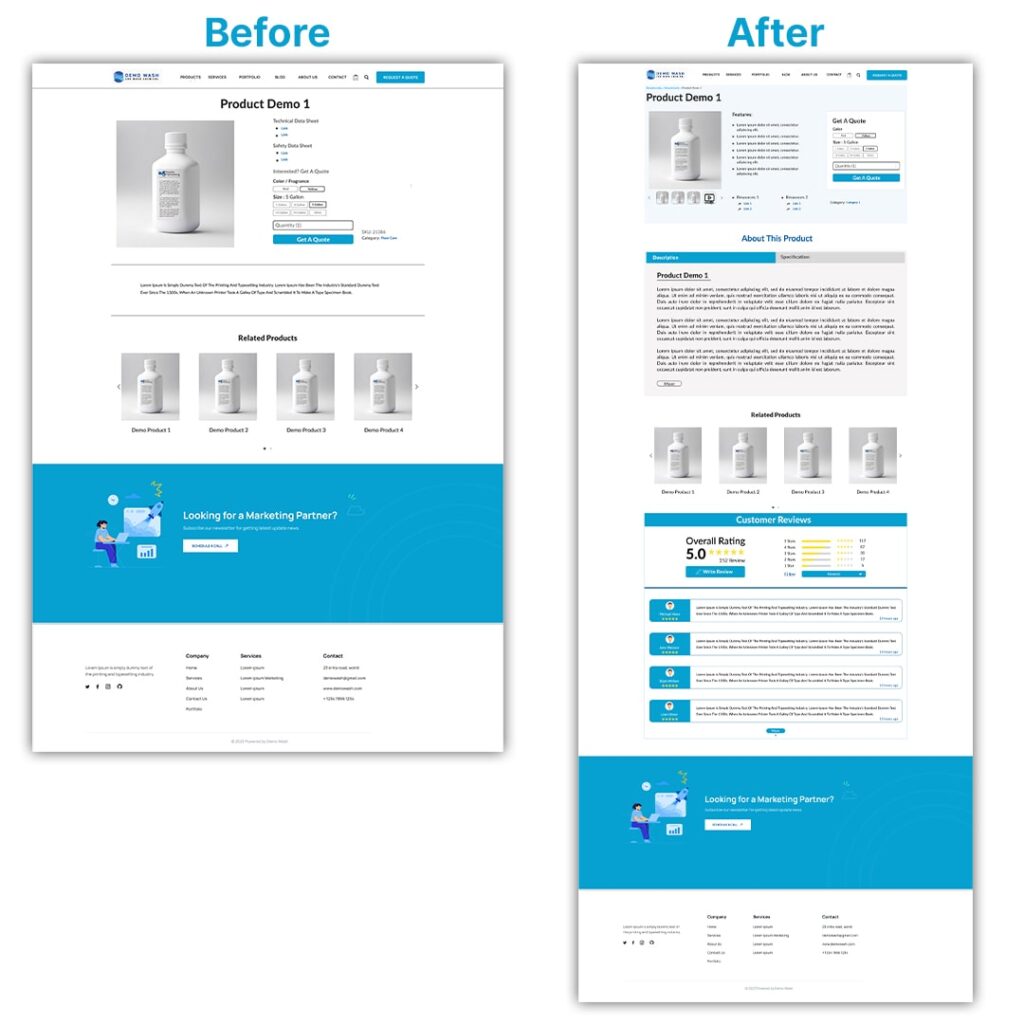A business’s reputation on social media platforms can make or break its success. Social media reputation management is all about actively monitoring, analyzing, and shaping how your brand is perceived online. It involves responding to customer feedback and reviews. Also, it involves proactively creating a positive image through engaging content and strategic campaigns.
One key aspect of social media reputation management is understanding the power of user-generated content. With customers freely sharing their experiences on social media, businesses must harness this content to build credibility and trust. By encouraging satisfied customers to leave reviews or share testimonials, companies can leverage the influence of word-of-mouth marketing in the digital realm.
Ultimately, effective social media reputation management is about building solid relationships with your audience. Engaging with customers in a genuine and timely manner shows that you value their input. And you are dedicated to providing a positive experience.
Read on to learn what, how, and why of Social Media Reputation Management.

What is Social Media Reputation Management?
Social media reputation management is the practice of observing and shaping how people perceive your brand on social media platforms like Facebook, Twitter, and TikTok. It involves monitoring social networks to shape and maintain a positive perception online.
Your organization’s online reputation is built on the references people make about your company. Each post, tweet, comment, or review that mentions your brand adds another brick to your reputational foundation.
Reputation management isn’t about controlling the narrative. It’s about listening to what customers say, learning from their feedback, and responding in a way that builds trust in your brand. This includes posting content, responding to feedback, conducting performance audits, and using social listening data to uncover how your audience views your brand.
With a reputation management plan, you’ll know when someone calls out your brand and the mood of that mention. Plus, you’ll have a plan to address it. You can shout positive messages far and wide and address the negative mentions before they become full-blown public relations crises.
The stakes are high. Over 2,000 executives surveyed attribute 63% of their companies’ value to their online reputations. Most consumers (93%, according to this survey) say online reviews affect their buying decisions. Even hiring is affected, as 86% of employees check reviews and ratings before applying for a job.
So, social media reputation management is a crucial aspect of maintaining a positive brand image and building trust with your customers. It requires frequent observation and strategic responses to shape the perception of your brand positively.
The Role of Social Media in Brand Reputation Management
Social media plays a pivotal role in brand reputation management. It has the power to shape narratives, foster engagement, and navigate challenges effectively. Here’s how:
- Shaping Reputation: Social media platforms, with billions of users worldwide, hold an extraordinary sway over public opinion. Positive reviews, testimonials, and engaging content can quickly elevate reputations.
- Monitoring and Listening: Actively tracking online conversations and mentions provides valuable insights into how your brand is perceived. Specialized tools can help you stay ahead, allowing you to address concerns, respond to questions, and even spot potential crises before they escalate.
- Building Trust and Loyalty: Social media allows brands to connect with their audience in a more personal way while building trust, loyalty, and credibility. In fact, 64% of buyers who feel a close connection with a brand are more willing to pay a premium price for its products and services.
- Competitor Analysis: Monitoring competitors’ social media activities and reputation can provide insights into their strategies and customer feedback.
- Integration with Other Channels: Social media can integrate with other communication channels. The dissemination of information collected through social media within the organization can help achieve higher brand awareness, brand reputation, and brand loyalty.

How to Manage Your Reputation on Social Media?
Managing your reputation on social media involves several key steps:
- Active Monitoring: Keep track of all mentions of your brand on various social media platforms. This includes posts, comments, reviews, and any other form of engagement that involves your brand.
- Engagement: Respond to both positive and negative feedback in a timely and professional manner. This shows your audience that you value their opinions and are willing to address their concerns.
- Content Creation: Regularly post engaging and valuable content that positively represents your brand. This can help shape the narrative around your brand and foster a positive reputation.
- Crisis Management: Have a plan in place to address any negative mentions or crises that may arise. This could involve issuing a public statement, directly addressing the issue with the concerned party, or taking other appropriate actions.
- Use of Tools: Utilize social media reputation management tools to streamline the monitoring and management process. These tools can help you stay on top of all mentions of your brand and respond promptly.
- Performance Audits: Regularly assess your social media performance and the state of your online reputation. This can help you understand what’s working, what’s not, and what you can do to improve.
- Social Listening: Implement social listening strategies to gain deeper insights into how your audience perceives your brand. This can help you identify trends, understand sentiment, and make informed decisions.
Remember, social media reputation management is not just about damage control but also about proactively building a positive brand image. It’s about listening, learning from feedback, and responding in a way that builds trust in your brand.
Social Media Reputation Management Software
Social media reputation management software is a tool that allows businesses to monitor, manage, and positively promote their brand on social media platforms. It encompasses online review management and social listening, where companies can monitor and respond to reviews that influence how people perceive their brand.
However, it’s much more than that, as review management is only one core part. A standard reputation management software also includes news monitoring, competitive analysis, and customer service, which all work together to help brands cultivate a strong reputation. These tools provide easy-to-use features to help brands respond to feedback and tackle issues effectively.
Here are some of the top online reputation management software for businesses:
- Sprout Social: At the forefront of the list of top online reputation management software is Sprout Social, which functions as a one-stop shop for everything regarding brand reputation management. Brands can take advantage of Sprout’s review management, social listening, and sentiment analysis features to monitor their brand’s online reputation at all times.
- Brand24: Brand24 is considered the best overall reputation management software.
- Nextiva: Nextiva is known for its social reputation management software.
- Birdeye: Birdeye is best for monitoring customer reviews.
- Podium: Podium is best for improving customer review results.
- Reputation.com: Reputation.com is best for understanding reputation levels.
These tools help businesses maintain a professional image, improve customers’ perception of their brand, boost brand visibility, increase revenue, and build customer trust. They allow companies to respond promptly to negative customer experiences before they spiral out of control.

Use of AI to Build a Positive Reputation on Social Media
Artificial Intelligence (AI) is increasingly being used to build a positive reputation on social media. Here’s an extensive overview:
- Content Generation: AI can suggest content ideas and even generate text, reducing the time spent brainstorming and writing. AI-powered tools can draw from a vast database of phrases, idioms, and trending keywords. Thus, they generate captions that resonate with your target audience.
- Image and Video Creation: The generative AI magic isn’t limited to creating captions. It extends to creating and enhancing visuals for social posts, eliminating the need for extensive manual editing.
- Sentiment Analysis: AI-driven sentiment analysis tools comb through large amounts of data on a brand or individual. Astonishingly, it can unravel online sentiments in real-time. Whether to determine the tone of a customer’s review or to assess social media mentions, these tools empower businesses to grasp the pulse of public perception swiftly.
- Social Media Monitoring: AI can help monitor social media channels for mentions of your brand, product, or service. This includes posts, comments, reviews, and any other form of engagement that involves your brand.
- Ad Management: AI can also be used to manage ads on social media. It can help determine the best time to post an ad, the most effective content for the ad, and the target audience for the ad.
- Influencer Research: AI can help identify influencers in your industry who can help promote your brand.
- Trending and Relevant Hashtags and Emojis: AI can suggest trending and relevant hashtags and emojis, which can help increase the visibility of your posts.
Overall, AI can play a significant role in building a positive reputation on social media. It can help generate content, analyze sentiments, monitor social media channels, manage ads, conduct influencer research, and much more.
Final Verdict
In conclusion, the benefits of effective reputation management cannot be overstated in today’s digital age. By actively monitoring and managing how your brand is perceived online, businesses can build trust with their audience, enhance credibility, and ultimately drive customer loyalty. A positive online reputation can also lead to increased sales, as consumers are more likely to choose a company they trust and perceive positively.
Moreover, effective reputation management can help businesses mitigate the impact of negative reviews or damaging content. By promptly addressing issues and responding proactively to feedback, companies can demonstrate their commitment to customer satisfaction and showcase their dedication to resolving any concerns.
Ultimately, investing in reputation management strategies pays off not just in terms of brand perception but also in long-term business success and growth.
FAQs
Social media affects reputation by providing a platform where actions, posts, or reviews can significantly influence public perception. Positive content can enhance reputation, while harmful content can damage it.
The three adverse effects of online reputation are:
Loss of trust: Negative online reviews and scandals can drastically erode consumer trust.
Financial impact: A poor online reputation can lead to loss of customers, impacting the company’s bottom line.
Recruitment challenges: Businesses with a poor online reputation may need help attracting top talent.
The disadvantages of a bad reputation include loss of customers, fall in sales, decrease in employee retention, difficulty hiring and increased hiring costs, significant financial losses or even bankruptcy, and increased liquidity risk, impacting stock price.
Reputation is both a risk and an impact. It’s a risk because negative events or perceptions can harm a company’s reputation. It’s an impact because a damaged reputation can lead to severe consequences, including loss of customers and revenue.








